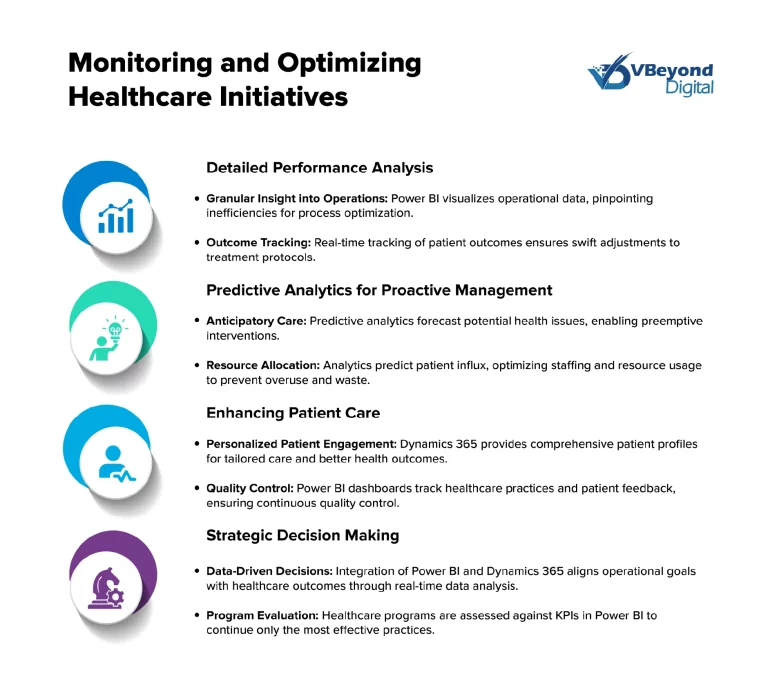Enhancing Data Strategies and Impact with Microsoft Dynamics 365 and Power BI in Healthcare
Section
Table of Contents
- Power BI’s Role in Transforming Healthcare Data Visualization
- Dynamics 365: Streamlining Patient Data Management
- Integrating Power BI in Healthcare with Dynamics 365 for Enhanced Insights
- Monitoring and Optimizing Healthcare Initiatives
- Advanced Analytics for Informed Decision-Making
- Enhancing Data Governance with SharePoint and Excel Integration
- Implementing Dynamics 365 and Power BI in Healthcare
- Conclusion
Section
This blog explores the transformative potential of integrating Power BI in healthcare with Microsoft Dynamics 365, focusing on enhancing data strategies and operational impact within the healthcare sector. It delves into how these powerful tools help healthcare organizations manage vast amounts of data effectively, facilitating better decision-making and improved patient outcomes. Through practical examples and expert insights, the article demonstrates the benefits of leveraging advanced analytics to streamline operations, enhance patient care, and optimize financial performance. Whether you’re looking to improve clinical outcomes, operational efficiency, or financial management, this guide provides valuable insights into harnessing the capabilities of Power BI and Dynamics 365 in healthcare.
In 2024, the convergence of data analytics and healthcare is poised to transform patient care significantly. Data-driven decisions are becoming the cornerstone of healthcare operations, aiming to enhance patient outcomes and optimize efficiency. With a projected increase in the adoption of electronic health records (EHRs) and health information exchanges (HIEs), healthcare organizations are turning towards robust data integration frameworks to manage the vast amounts of available data efficiently.
Integrated solutions built with Microsoft Dynamics 365 and Power BI in healthcare help organizations drive these transformations with scalable and measurable impact. Comprehensive ERP solutions built on Dynamics 365 streamlines patient data management across different healthcare touchpoints, creating a more unified and effective healthcare system. At the same time, business intelligence with predictive analytics helps to measure, optimize, and improve patient care and operational efficiencies. Continue reading to learn how this works and the impact for healthcare organizations.
Power BI’s Role in Transforming Healthcare Data Visualization
Power BI in healthcare has been instrumental in transforming data visualization by providing interactive dashboards and real-time analytics.
Microsoft’s Cloud for Healthcare integrates with Power BI to provide comprehensive patient views that enhance personalized care and streamline health data management. This integration supports healthcare providers by offering detailed insights into patient interactions and health trends, which are vital for improving treatment outcomes and patient engagement.
Cegeka Pharma & Life Sciences can assist in ensuring regulatory compliance, quality control, and streamlined inventory management, making it a critical tool for healthcare organizations utilizing Power BI for real-time data visualization and regulatory reporting.
Dynamics 365: Streamlining Patient Data Management
Dynamics 365 significantly enhances patient data management through its robust integration and analytics capabilities, making it an essential tool for healthcare organizations aiming to optimize their operations and patient care. Here are more detailed insights into how Dynamics 365 improves healthcare data management:
- Unified Data Ecosystem: Dynamics 365 integrates data from various healthcare systems and repositories into a centralized platform. This unification allows healthcare providers to have a holistic view of patient data across different service points, facilitating improved care delivery and operational decisions.
- Automation of Routine Tasks: By automating routine data entry and processing tasks, Dynamics 365 reduces the administrative burden on healthcare staff. This automation speeds up processes such as patient admissions, billing, and record updates, allowing staff to focus more on patient care rather than administrative duties.
- Advanced Analytics for Patient Care: Dynamics 365 leverages advanced analytics to provide healthcare providers with actionable insights into patient care processes. By analyzing patient data, healthcare providers can identify trends, predict patient outcomes, and make data-driven decisions that enhance patient care quality.
- Compliance and Security: Dynamics 365 helps healthcare organizations maintain strict compliance with healthcare regulations such as HIPAA. The platform ensures that all patient data is managed and stored securely, with advanced security measures in place to protect against data breaches and unauthorized access.
- Improved Patient Engagement: Dynamics 365 enables healthcare organizations to enhance patient engagement through personalized communication tools and portals. Patients can access their health records, manage appointments, and communicate with their healthcare providers, which improves overall patient satisfaction and health outcomes.
- Scalability and Flexibility: As healthcare organizations grow and their data needs evolve, Dynamics 365 offers the scalability needed to handle increased data volumes without compromising performance. This flexibility ensures that healthcare providers can expand their operations and integrate new technologies or modules as needed.
- Interoperability with Other Microsoft Solutions: The seamless integration of Dynamics 365 with other Microsoft tools like Power BI in healthcare and Microsoft Teams for collaboration further enhances the platform’s utility in healthcare settings. This interoperability fosters a collaborative environment where data insights are easily shared and utilized across departments.
D365 [Health] ERP can streamline operations across multi-location healthcare facilities, enhancing patient data management and operational efficiency. Its unified platform supports financial management and strategic decision-making, making it an essential tool for healthcare organizations seeking to optimize their patient data management processes.
Integrating Power BI in Healthcare with Dynamics 365 for Enhanced Insights
Integrating Power BI in healthcare with Dynamics 365 can significantly enhance the insights healthcare organizations derive from their data, making it a pivotal strategy in healthcare data management. This integration facilitates a deeper understanding of patient data, operational metrics, and financial statistics, supporting advanced decision-making and strategic planning.
Enhanced Patient Care Coordination
- Unified Patient Profiles: Integrating Power BI in healthcare with Dynamics 365 allows for the creation of unified patient profiles by amalgamating data from various sources. This holistic view aids healthcare providers in delivering personalized care plans and improving patient outcomes.
- Real-time Data Access: Clinicians receive real-time access to patient data, enabling immediate and informed decision-making in critical care situations. This integration supports healthcare providers in delivering timely and effective treatments.
Operational Excellence and Efficiency
- Streamlined Operations: By analyzing operational data through Power BI, healthcare organizations can identify inefficiencies and streamline processes. Integration with Dynamics 365 facilitates the automation of routine tasks, reducing the administrative burden on healthcare staff and allowing more focus on patient care.
- Resource Allocation: Predictive analytics in healthcare powered by this integration helps in effective resource management. Forecasting tools predict patient inflows and help manage staffing and inventory more efficiently, ensuring resources are optimally utilized without waste.
Healthcare Materials Management can automate and optimize inventory and procurement processes, significantly improving operational efficiency in healthcare facilities. With real-time inventory management and automated replenishment features, this app reduces administrative overhead, freeing up resources for patient care.
Compliance and Best Practices in Data Security
- Regulatory Compliance: The integration ensures that all data handling within the system adheres to healthcare compliance tools and regulations such as HIPAA. Dynamics 365 and Power BI together provide robust security measures that safeguard patient information and ensure data privacy.
- Audit Trails and Data Integrity: Enhanced tracking of data changes and access logs helps in maintaining high data integrity and creating reliable audit trails, essential for both compliance and quality control in healthcare settings.
Strategic Decision Making
- Predictive Analytics: Leveraging the combined power of Dynamics 365 and Power BI in healthcare, use predictive analytics to anticipate future trends in patient care and healthcare demands. This foresight allows for better strategic planning and proactive healthcare management.
- Healthcare Trends Analysis: The integration allows healthcare leaders to analyze vast amounts of data to identify and act on emerging healthcare trends, thereby staying ahead in a rapidly evolving sector
Merit for Life Science offers robust capabilities for meeting the operational needs of pharmaceutical and life science companies. Its focus on FDA compliance and quality management ensures that healthcare organizations can integrate operational and patient data seamlessly, allowing for enhanced decision-making and predictive analytics with Power BI.

Monitoring and Optimizing Healthcare Initiatives
Monitoring processes, outcomes, and optimizing healthcare initiatives are pivotal in ensuring effective delivery of services. By integrating Power BI in healthcare with Dynamics 365, enterprises gain a more profound insight into their operations, leading to improved patient outcomes and optimized resource utilization. Here’s how enhanced monitoring and optimization benefit healthcare organizations:
Detailed Performance Analysis
- Granular Insight into Operations: Power BI provides detailed visualizations of operational data, allowing healthcare managers to pinpoint inefficiencies and optimize processes.
- Outcome Tracking: Patient outcomes are tracked in real-time, helping to assess the effectiveness of treatments and adjust protocols swiftly to improve care delivery.
Predictive Analytics for Proactive Management
- Anticipatory Care: Predictive analytics in healthcare forecast potential health issues before they escalate, allowing for preemptive medical interventions which can significantly reduce emergency cases.
- Resource Allocation: Analytics help predict patient influx, which aids in optimal staffing and resource allocation, ensuring that the healthcare facility operates efficiently without overuse or wastage of resources.
Enhancing Patient Care
- Personalized Patient Engagement: Dynamics 365 enables healthcare providers to maintain a comprehensive patient profile that aids in tailored patient care and management, improving patient satisfaction and health outcomes.
- Quality Control: Continuous monitoring of healthcare practices and patient feedback through Power BI in healthcare dashboards supports quality control measures, maintaining high standards of healthcare service.
Strategic Decision Making
- Data-Driven Decisions: Integrating historical and real-time data from Power BI in healthcare with patient management systems in Dynamics 365 provides a robust basis for strategic decision-making, aligning operational goals with healthcare outcomes.
- Program Evaluation: Healthcare programs can be evaluated against key performance indicators displayed in Power BI, ensuring that only the most effective practices are continued.
AXP365 Advanced Quality Management (LIMS) enhances healthcare monitoring and optimization efforts by providing integrated quality control and compliance tools. This app supports advanced sample management, batch approval processes, and ensures compliance with healthcare standards, improving healthcare delivery and operational quality.
Advanced Analytics for Informed Decision-Making
Advanced analytics in healthcare, leveraging tools like Power BI in healthcare and Dynamics 365, significantly enhances decision-making capabilities within healthcare organizations. These technologies enable the analysis of vast data sets in real-time, supporting dynamic healthcare environments with actionable insights.
Enhanced Decision-Making Capabilities
- Comprehensive Patient Profiles: By integrating data from multiple healthcare systems, advanced analytics provide a holistic view of patient health. This comprehensive approach supports personalized care plans and can significantly improve patient outcomes.
- Operational Efficiency: Analytics identify bottlenecks in healthcare processes, from patient admission to discharge. This helps in streamlining operations, reducing wait times, and increasing patient satisfaction.
- Cost Management: Through detailed data analysis, healthcare organizations can pinpoint areas of excessive spending and adjust resource allocation. This leads to more efficient use of funds, which is critical in managing healthcare budgets effectively.
Predictive Healthcare Management
- Disease Outbreak Prediction: Predictive models can analyze patterns from historical data to forecast potential disease outbreaks, allowing healthcare providers to prepare and respond proactively.
- Patient Readmission Risks: Using predictive analytics, healthcare providers can identify patients at high risk of readmission and tailor follow-up care to prevent future hospital stays, thereby reducing costs and improving care quality.
Quality of Care Improvement
- Treatment Optimization: By analyzing outcomes from various treatment modalities, analytics help in determining the most effective treatments for specific conditions, thus enhancing the quality of care provided to patients.
- Health Trend Analysis: Analytics can track health trends over time within populations, aiding public health officials and healthcare providers in developing targeted health programs and interventions.
Montfort Hospital’s utilization of Power BI demonstrates the practical benefits of these analytics, showing how real-time data visualization can lead to rapid operational adjustments and improved patient care outcomes (Power BI). Furthermore, Microsoft’s Fabric initiative highlights the importance of integrating analytics across various data sources to unlock clinical and operational insights that drive better patient care.
Enhancing Data Governance with SharePoint and Excel Integration
Integrating Power BI and Dynamics 365 with SharePoint and Excel supports robust data governance, crucial for maintaining the integrity and security of healthcare data.
Integration Benefits
- Seamless Data Handling: SharePoint integration facilitates efficient data management and access control, aligning with healthcare compliance tools to protect sensitive information.
- Advanced Data Analysis: Excel remains a powerful tool for detailed data analysis. Combined with Power BI’s visualization capabilities, it allows healthcare professionals to conduct in-depth analyses and gain critical insights into patient care and healthcare operations.
Microsoft’s integration features provide applications and solutions for healthcare organizations to manage, analyze, and protect data while adhering to best practices for data security and compliance.
Best Practices for Data Security and Compliance
Healthcare organizations must implement stringent data security and compliance practices to safeguard sensitive patient information and adhere to regulatory requirements. Here are some essential best practices to enhance data security and ensure compliance:
- Role-Based Access Control (RBAC): Implementing RBAC helps ensure that healthcare data is accessible only to authorized personnel based on their roles within the organization. This minimizes the risk of unauthorized access and enhances overall data security.
- Encryption of Data: Encrypting data both in transit and at rest is critical. This ensures that sensitive patient data is protected from unauthorized access, making it unreadable without the correct decryption keys.
- Multi-Factor Authentication (MFA): MFA adds an additional layer of security by requiring users to provide two or more verification forms. This significantly reduces the risk of unauthorized access, even if a password is compromised.
- Regular System Updates and Patch Management: Keeping software and systems updated is crucial to protect against vulnerabilities. Regular patches and updates close security gaps that could be exploited by cybercriminals.
- Comprehensive Training and Awareness Programs: Regular training on data security best practices and HIPAA compliance is essential. Educating staff about potential cyber threats, such as phishing attacks and the proper handling of patient information, helps prevent breaches.
Incident Response Planning: Developing and maintaining a robust incident response plan is necessary for quickly addressing data breaches. This plan should include procedures for containment, assessment, notification, and remediation to minimize damage and restore trust if a breach occurs.
Security Features:
- Data Encryption: Both Power BI and Dynamics 365 employ strong encryption methods for data at rest and in transit, safeguarding information against unauthorized access.
- Access Controls: These tools implement detailed access controls, allowing only authorized personnel to access sensitive data, which is essential for maintaining privacy and security standards.
Healthcare organizations benefit greatly from these security measures, as illustrated by Microsoft’s comprehensive approach to security, which includes regular updates and patches to protect against emerging threats. Further, the Azure platform, underpinning these tools, provides additional security features, ensuring that healthcare data is managed in a secure and compliant environment.
Implementing Dynamics 365 and Power BI in Healthcare
The deployment of Power BI and Dynamics 365 in healthcare settings involves strategic planning and precise execution to ensure that these tools are utilized effectively to enhance data-driven decision-making and improve patient care.
Implementation Steps
- System Assessment and Planning: Assess current data systems and infrastructure to ensure compatibility and identify areas for integration.
- Staff Training: Conduct comprehensive training sessions for healthcare staff to familiarize them with Power BI and Dynamics 365 functionalities, focusing on how these tools can be used in their daily operations.
Microsoft’s deployment guides and training resources provide a wealth of information to support organizations through this process for a smoother transition to, and effective adoption, of these powerful tools.
As healthcare continues to evolve, so do the strategies for managing and utilizing data. Future trends in healthcare will likely include further advancements in AI and machine learning, offering even more sophisticated analytics capabilities and deeper insights into patient care and healthcare operations.
Future Enhancements
- AI and Machine Learning: These technologies will play a larger role in predictive analytics in healthcare, providing more accurate predictions and personalized care plans.
- Increased Data Integration: As more devices and platforms become connected, healthcare data integration will become more complex and comprehensive, requiring advanced tools like Power BI and Dynamics 365 to manage and analyze data effectively.
Conclusion
Strategically integrated solutions built with Power BI and Dynamics 365 in a healthcare service environment can support critical digital transformation initiatives and positively impact both service delivery and revenues through advanced data management and enhanced patient care. These tools not only streamline healthcare operations but also foster a data-driven culture that is pivotal in modern healthcare environments.
Healthcare executives are encouraged to consider these powerful tools as part of their digital transformation strategies to not only meet current IT and service delivery demands, but to also prepare for future advancements in healthcare technology. As healthcare continues to evolve, staying ahead of technological advancements with tools like Dynamics 365 and Power BI in healthcare will be crucial.
For further reading and resources on implementing these technologies in your healthcare organization, Microsoft offers a wealth of information on its Healthcare technology page.
To discuss your organization’s needs, get in touch to consult our experts.




